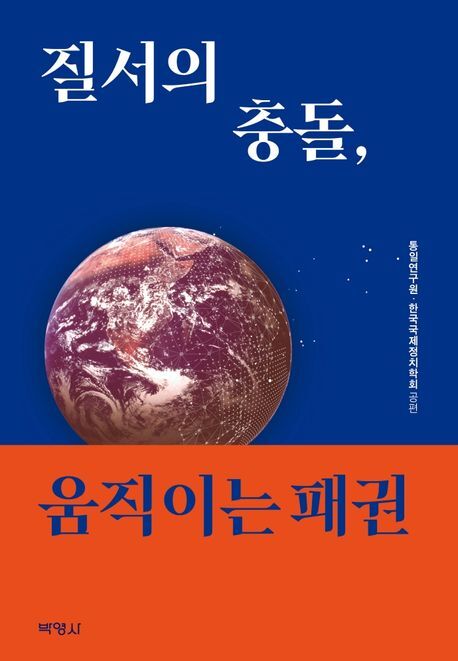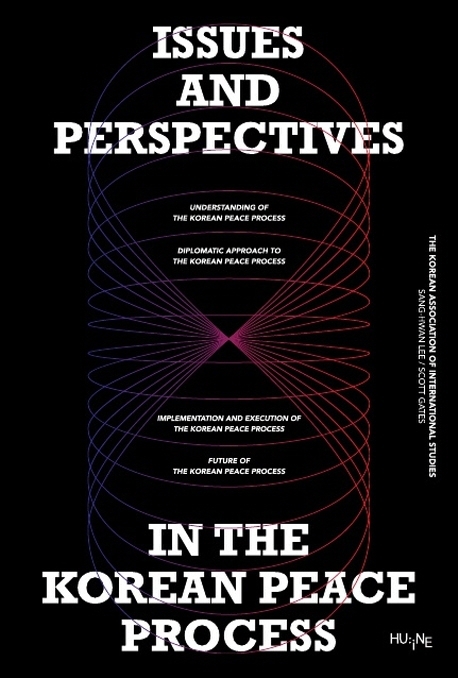단행본
[Notice] 개인정보(연락처, 이메일 등) 작성 금지.
[Notice] 홈페이지 개편으로 비밀번호가 초기화되었습니다.(전체메일(2020-05-19), 홈페이지 메인 화면 공지 팝업 참고)

2
통일연구원·한국국제정치학회 지음, 『질서의 충돌, 움직이는 패권』
『질서의 충돌, 움직이는 패권』
통일연구원·한국국제정치학회 지음박영사︱2022년 02월 25일 발행ISBN 979-11-303-1491-4 (93340)
목차제1부 세계질서에 대한 국제정치이론적 고찰1 장 현실주의 국제정치이론과 세계질서 [전재성] / 52 장 자유주의 국제정치이론과 세계질서 [전재성] / 163 장 구성주의 국제정치이론과 세계질서 [전재성] / 234 장 다양한 비판이론의 갈래와 세계질서 [전재성] / 28
제2부 세계질서 변화를 이끄는 핵심 이슈1 장 세계질서 변화와 IPE [이용욱] / 382 장 신흥안보 시대의 도래와 코로나19 [윤정현] / 57
제3부 세계질서를 바라보는 주요국의 시각과 대응1 장 미국의 세계질서론과 동아시아 전략 [차태서] / 872 장 중국의 세계질서론과 동아시아 전략 [김애경] / 1053 장 세계질서 재편과 일본의 동아시아 전략 [임은정] / 1234 장 세계질서 재편과 유럽의 딜레마 [김종법] / 137
제4부 세계질서 재편기의 한반도1 장 정치·안보 차원의 영향 분석 [박인휘] / 1752 장 경제·외교 차원의 영향 분석 [이효원] / 1993 장 질서 재편기 속 흔들리는 한반도 [박은주·정성철] / 2194 장 새로운 한반도체제의 구성과 수립 [박은주·정성철] / 229
책소개질서의 충돌
프롤로그
통일·북한·평화연구의 국내 유일 국책 연구기관인 통일연구원이 불가역적인 한반도 평화와 번영의 길을 찾아 나섰지만, 아직 갈 길이 멀다. 2018년에 시작한 ‘한반도의 봄’이 북미정상회담 결렬 이후 가을의 결실을 거두지 못하고 다시 얼어붙었다.
북·미관계의 교착과 남북관계의 단절이 지속되는 가운데 미·중 전략경쟁이 본격화되고, 코로나19 팬데믹이 계속되면서 한반도 정세는 더욱 불투명해졌다. 북·미 사이의 한반도 평화-비핵 교환 협상의 성공을 전제로 구상했던 ‘신한반도체제 구상’은 하노이 노딜no-deal로 더는 실현하기 어려운 꿈이 됐다.
분단과 전쟁, 냉전과 체제경쟁에서 경험했듯이 한반도 정세는 세계 정세와 밀접한 연관성 속에서 역동적으로 움직여 왔다. 미국과 중국이 참전한 한국전쟁은 아직도 끝나지 않았고, 정전협정에 기초한 질서가 분단체제로 굳어져 우리의 일상을 제약하고 있다.
미국과 중국이 전략경쟁을 본격화하면서 두 나라와 밀접한 상호의존관계를 맺고 있는 대한민국의 고민도 깊어지고 있다. 안보는 미국, 경제는 중국이라며 ‘안미경중安美經中’이라는 말을 쓰기도 하지만, 이미 대한민국은 어느 한 나라를 선택할 수 없을 정도로 두 나라와 밀접한 상호의존관계를 유지하고 있다. 중국이 개혁·개방을 본격화할 때, 한국의 개발모델인 ‘유치를 통한 개발촉진’ 정책을 추진하고 한국의 기술을 받아들여 생산력 기반의 빠른 발전을 이뤘다. 현재 미국은 한국의 첨단산업 유치를 적극적으로 시도하며, 가치사슬의 우위를 유지하려 한다.
미·중 전략경쟁이 본격화되고 있지만, 세계가 다양한 가치사슬에 얽혀있어 냉전시대처럼 제로섬zero-sum적인 극한의 진영대결을 지속하기는 어려울 것이다. 패권경쟁으로 치닫고 있는 미국과 중국이 우리에게 선택을 강요할지 모른다. 어쩌면 선도국가로 진입한 대한민국이 선택을 당하기보다는 우리의 국익에 따라 전략적 선택을 할 수도 있을 것이다.
통일연구원이 세계질서의 재편과 새로운 한반도체제와 관련한 연구를 기획한 것은 세계질서 변화의 흐름을 잘 파악하여 평화와 번영의 한반도를 만들기 위한 지혜를 모으기 위함이다. 지금의 세계질서는 경제와 군사안보 등 하드파워 위주의 질서를 넘어, 문화와 지식정보 등 소프트파워가 결합된 스마트파워에 의해서 구축되고 있다. 움직이는 세계질서는 인간과 국가 행위자뿐만 아니라 사물 등 비인간 행위자(AI, 가상화폐, 탄소 등)를 포함한 다양한 행위자들이 상호작용하여 만들어가고 있다.
현재 세계질서는 민주주의와 시장경제라는 가치 위주의 질서를 넘어 자본주의 세계경제(세계체제) 틀 내에서 세계적 단위의 노동분업 구조와 다양한 가치사슬을 형성하고 있어 본질 파악이 쉽지 않다. 그래서 통일연구원은 미·중 전략경쟁이 첨예하게 대립하는 세계질서 속에서 한반도가 나아가야 할 길은 어디인가? 정작 한반도의 주인들은 왜 격변기의 중심에 서 있으면서도 새로운 한반도를 꿈꾸지 않는 걸까? 냉전의 산물인 분단체제에서 발생하는 남북한 간의 갈등을 왜 감내만 하려는 것인가? 등과 관련한 의문을 품고, 한국국제정치학회와 함께 다양한 시각에서 세계질서의 본질을 파악하고 대한민국의 새로운 국가전략을 모색하기 위한 협동연구를 시도했다.
통일연구원은 국책 연구기관으로서 세계질서 변화라는 거대한 환경변화 속에서 새로운 한반도의 미래상을 통찰할 역사적 소명을 부여받고 있다. 그런 차원에서 2021년도 연구과제로 〈남북관계 2023: 한반도 평화의 미래상〉이라는 대주제 아래 『세계질서의 재편과 신한반도체제』라는 연구과제를 수행했다. 이 책은 연구결과물의 확산 차원에서 연구보고서를 대중용 학술서로 편집하고 다듬은 것이다. 이 연구성과는 세계정세에 관심 있는 일반독자는 물론 대학에서 교재로 활용할 수 있을 것이다. 고등학교에 국제정치, 국제관계와 국제기구 교과목이 있어 이연구서가 심화학습의 참고자료로 활용될 수 있을 것이라는 기대를 해본다.
통일연구원은 세계질서 변화라는 거대담론 연구의 필요성을 절감하고, 한국국제정치학회와 협동연구를 통해 이 책을 탄생시켰다. 현존하는 세계질서의 형성과정부터 현재 나타나고 있는 변화를 국제정치이론과 국제관계이론을 적용하여 고찰했다. 세계질서 재편을 유인하는 이슈가 무엇인지를 밝히는 과정과 미국, 중국, 일본, 유럽 등의 주요국들이 현재 나타나는 질서의 변화를 어떻게 바라보는지를 살펴봤다. 그리고 이러한 변화가 한반도에 어떤 영향을 미치는지를 분석했다. 이러한 복잡하고 어려운 과정에 동참해 주신 연구자들께 깊은 감사를 드린다.
새로운 한반도 체제는 세계질서 재편의 과정에서 다양한 경로와 유형으로 나타날 수 있다. 그 모습은 자아준거적self-referential 시각에서 우리가 얼마나 노력하느냐에 따라 달라질 수 있을 것이다. 이 책에 새로운 한반도 체제 수립을 위한 거대담론과 시나리오까지 담아내지 못한 점은 아쉬움으로 남는다. 그런데도 주요국들의 역학관계 변화와 질서 균열을 초래한 이슈 등을 파악하여 국가 전략적 차원에서 새로운 한반도 체제를 고민한 것만으로도 의미가 크다고 생각한다.
이 책이 대중서로 세상의 빛을 보기까지의 과정을 떠올려보면, 우여곡절이 참 많았다. 이 책이 대중과 소통할 수 있도록 물심양면으로 도와 주신 분들께 감사 인사를 전한다. 가장 먼저, 대형과제의 연구책임자로서 책무를 잘 수행한 박은주 박사에게 고마움을 전한다. 또 어려운 주제임에도 불구하고 통일연구원과의 협동 연구에 흔쾌히 동참해 주신 2021년도 한국국제정치학회 전재성 회장님과 필진으로 참여해 주신 박인휘 교수님, 김종법 교수님, 이용욱 교수님, 김애경 교수님, 정성철 교수님, 임은정 교수님, 차태서 교수님, 윤정현 박사님, 이효원 교수님께 깊은 감사를 드린다. 그리고 마지막으로 이 책이 나오기까지 11인의 연구자들을 지원해 준 용혜민 연구원에게도 고마움을 전한다. 또 편집과 윤문 등을 위해 고생하신 박영사의 관계자 여러분께도 감사드린다.
앞으로도 통일연구원은 대한민국 유일의 북한·통일·평화 전문 국책 연구기관으로서 정책환경의 변화를 기민하게 읽고, 능동적이고 선제적으로 ‘창의적’ 대안을 제기하기 위해 노력할 것이다.
감사합니다.
2022. 2. 25.
통일연구원 원장 고유환
관리자 2022.02.25
『질서의 충돌, 움직이는 패권』
통일연구원·한국국제정치학회 지음박영사︱2022년 02월 25일 발행ISBN 979-11-303-1491-4 (93340)
목차제1부 세계질서에 대한 국제정치이론적 고찰1 장 현실주의 국제정치이론과 세계질서 [전재성] / 52 장 자유주의 국제정치이론과 세계질서 [전재성] / 163 장 구성주의 국제정치이론과 세계질서 [전재성] / 234 장 다양한 비판이론의 갈래와 세계질서 [전재성] / 28
제2부 세계질서 변화를 이끄는 핵심 이슈1 장 세계질서 변화와 IPE [이용욱] / 382 장 신흥안보 시대의 도래와 코로나19 [윤정현] / 57
제3부 세계질서를 바라보는 주요국의 시각과 대응1 장 미국의 세계질서론과 동아시아 전략 [차태서] / 872 장 중국의 세계질서론과 동아시아 전략 [김애경] / 1053 장 세계질서 재편과 일본의 동아시아 전략 [임은정] / 1234 장 세계질서 재편과 유럽의 딜레마 [김종법] / 137
제4부 세계질서 재편기의 한반도1 장 정치·안보 차원의 영향 분석 [박인휘] / 1752 장 경제·외교 차원의 영향 분석 [이효원] / 1993 장 질서 재편기 속 흔들리는 한반도 [박은주·정성철] / 2194 장 새로운 한반도체제의 구성과 수립 [박은주·정성철] / 229
책소개질서의 충돌
프롤로그
통일·북한·평화연구의 국내 유일 국책 연구기관인 통일연구원이 불가역적인 한반도 평화와 번영의 길을 찾아 나섰지만, 아직 갈 길이 멀다. 2018년에 시작한 ‘한반도의 봄’이 북미정상회담 결렬 이후 가을의 결실을 거두지 못하고 다시 얼어붙었다.
북·미관계의 교착과 남북관계의 단절이 지속되는 가운데 미·중 전략경쟁이 본격화되고, 코로나19 팬데믹이 계속되면서 한반도 정세는 더욱 불투명해졌다. 북·미 사이의 한반도 평화-비핵 교환 협상의 성공을 전제로 구상했던 ‘신한반도체제 구상’은 하노이 노딜no-deal로 더는 실현하기 어려운 꿈이 됐다.
분단과 전쟁, 냉전과 체제경쟁에서 경험했듯이 한반도 정세는 세계 정세와 밀접한 연관성 속에서 역동적으로 움직여 왔다. 미국과 중국이 참전한 한국전쟁은 아직도 끝나지 않았고, 정전협정에 기초한 질서가 분단체제로 굳어져 우리의 일상을 제약하고 있다.
미국과 중국이 전략경쟁을 본격화하면서 두 나라와 밀접한 상호의존관계를 맺고 있는 대한민국의 고민도 깊어지고 있다. 안보는 미국, 경제는 중국이라며 ‘안미경중安美經中’이라는 말을 쓰기도 하지만, 이미 대한민국은 어느 한 나라를 선택할 수 없을 정도로 두 나라와 밀접한 상호의존관계를 유지하고 있다. 중국이 개혁·개방을 본격화할 때, 한국의 개발모델인 ‘유치를 통한 개발촉진’ 정책을 추진하고 한국의 기술을 받아들여 생산력 기반의 빠른 발전을 이뤘다. 현재 미국은 한국의 첨단산업 유치를 적극적으로 시도하며, 가치사슬의 우위를 유지하려 한다.
미·중 전략경쟁이 본격화되고 있지만, 세계가 다양한 가치사슬에 얽혀있어 냉전시대처럼 제로섬zero-sum적인 극한의 진영대결을 지속하기는 어려울 것이다. 패권경쟁으로 치닫고 있는 미국과 중국이 우리에게 선택을 강요할지 모른다. 어쩌면 선도국가로 진입한 대한민국이 선택을 당하기보다는 우리의 국익에 따라 전략적 선택을 할 수도 있을 것이다.
통일연구원이 세계질서의 재편과 새로운 한반도체제와 관련한 연구를 기획한 것은 세계질서 변화의 흐름을 잘 파악하여 평화와 번영의 한반도를 만들기 위한 지혜를 모으기 위함이다. 지금의 세계질서는 경제와 군사안보 등 하드파워 위주의 질서를 넘어, 문화와 지식정보 등 소프트파워가 결합된 스마트파워에 의해서 구축되고 있다. 움직이는 세계질서는 인간과 국가 행위자뿐만 아니라 사물 등 비인간 행위자(AI, 가상화폐, 탄소 등)를 포함한 다양한 행위자들이 상호작용하여 만들어가고 있다.
현재 세계질서는 민주주의와 시장경제라는 가치 위주의 질서를 넘어 자본주의 세계경제(세계체제) 틀 내에서 세계적 단위의 노동분업 구조와 다양한 가치사슬을 형성하고 있어 본질 파악이 쉽지 않다. 그래서 통일연구원은 미·중 전략경쟁이 첨예하게 대립하는 세계질서 속에서 한반도가 나아가야 할 길은 어디인가? 정작 한반도의 주인들은 왜 격변기의 중심에 서 있으면서도 새로운 한반도를 꿈꾸지 않는 걸까? 냉전의 산물인 분단체제에서 발생하는 남북한 간의 갈등을 왜 감내만 하려는 것인가? 등과 관련한 의문을 품고, 한국국제정치학회와 함께 다양한 시각에서 세계질서의 본질을 파악하고 대한민국의 새로운 국가전략을 모색하기 위한 협동연구를 시도했다.
통일연구원은 국책 연구기관으로서 세계질서 변화라는 거대한 환경변화 속에서 새로운 한반도의 미래상을 통찰할 역사적 소명을 부여받고 있다. 그런 차원에서 2021년도 연구과제로 〈남북관계 2023: 한반도 평화의 미래상〉이라는 대주제 아래 『세계질서의 재편과 신한반도체제』라는 연구과제를 수행했다. 이 책은 연구결과물의 확산 차원에서 연구보고서를 대중용 학술서로 편집하고 다듬은 것이다. 이 연구성과는 세계정세에 관심 있는 일반독자는 물론 대학에서 교재로 활용할 수 있을 것이다. 고등학교에 국제정치, 국제관계와 국제기구 교과목이 있어 이연구서가 심화학습의 참고자료로 활용될 수 있을 것이라는 기대를 해본다.
통일연구원은 세계질서 변화라는 거대담론 연구의 필요성을 절감하고, 한국국제정치학회와 협동연구를 통해 이 책을 탄생시켰다. 현존하는 세계질서의 형성과정부터 현재 나타나고 있는 변화를 국제정치이론과 국제관계이론을 적용하여 고찰했다. 세계질서 재편을 유인하는 이슈가 무엇인지를 밝히는 과정과 미국, 중국, 일본, 유럽 등의 주요국들이 현재 나타나는 질서의 변화를 어떻게 바라보는지를 살펴봤다. 그리고 이러한 변화가 한반도에 어떤 영향을 미치는지를 분석했다. 이러한 복잡하고 어려운 과정에 동참해 주신 연구자들께 깊은 감사를 드린다.
새로운 한반도 체제는 세계질서 재편의 과정에서 다양한 경로와 유형으로 나타날 수 있다. 그 모습은 자아준거적self-referential 시각에서 우리가 얼마나 노력하느냐에 따라 달라질 수 있을 것이다. 이 책에 새로운 한반도 체제 수립을 위한 거대담론과 시나리오까지 담아내지 못한 점은 아쉬움으로 남는다. 그런데도 주요국들의 역학관계 변화와 질서 균열을 초래한 이슈 등을 파악하여 국가 전략적 차원에서 새로운 한반도 체제를 고민한 것만으로도 의미가 크다고 생각한다.
이 책이 대중서로 세상의 빛을 보기까지의 과정을 떠올려보면, 우여곡절이 참 많았다. 이 책이 대중과 소통할 수 있도록 물심양면으로 도와 주신 분들께 감사 인사를 전한다. 가장 먼저, 대형과제의 연구책임자로서 책무를 잘 수행한 박은주 박사에게 고마움을 전한다. 또 어려운 주제임에도 불구하고 통일연구원과의 협동 연구에 흔쾌히 동참해 주신 2021년도 한국국제정치학회 전재성 회장님과 필진으로 참여해 주신 박인휘 교수님, 김종법 교수님, 이용욱 교수님, 김애경 교수님, 정성철 교수님, 임은정 교수님, 차태서 교수님, 윤정현 박사님, 이효원 교수님께 깊은 감사를 드린다. 그리고 마지막으로 이 책이 나오기까지 11인의 연구자들을 지원해 준 용혜민 연구원에게도 고마움을 전한다. 또 편집과 윤문 등을 위해 고생하신 박영사의 관계자 여러분께도 감사드린다.
앞으로도 통일연구원은 대한민국 유일의 북한·통일·평화 전문 국책 연구기관으로서 정책환경의 변화를 기민하게 읽고, 능동적이고 선제적으로 ‘창의적’ 대안을 제기하기 위해 노력할 것이다.
감사합니다.
2022. 2. 25.
통일연구원 원장 고유환
관리자 2022.02.25

1
한국국제정치학회 지음, 『Issues and Perspectives in The Korean Peace Process』
한국국제정치학회 지음, 『Issues and Perspectives in The Korean Peace Process』
한국국제정치학회 지음 | 휴인 펴냄 | 2021년 02월 25일 발행ISBN 979-11-5901-852-7 [93340]
이 책은 1990년대 이래 대북정책을 고찰함으로써 현 정부의 ‘한반도 평화프로세스’ 정책에 대한 폭넒은 이해를 구하고자 한다. 한반도 평화프로세스는 남북한 갈등을 해결하고 북한을 비핵화하기 위해서 고안된 것이다. 김대중 정부하에서 대북 햇볕정책이 있었고 최초의 남북정상회담이 열렸다. 노무현 정부도 대북 포용정책을 이어갔으며 2006년에 북한의 첫 번째 핵무기 실험에도 불구하고 2007년에 두 번째 남북정상회담이 이뤄졌다. 2017년에 문재인 정부는 김대중·노무현 정부의 대북정책을 계승했고 그동안 수차례의 남북정상의 만남이 있었다. 남북한 간 한반도의 항구적 평화와 완전한 비핵화를 위한 판문점 선언 등이 체결되었으나 그 실효적 결과는 아직 모호한 상황이다. 한편, 문재인 정부는 북미 정상회담을 중재하며 한반도 비핵화를 위한 노력을 다해왔으나 북미 간 하노이 정상회담 결렬 후 그 길을 찾지 못하고 있다. 이 책은 네 가지 세부 의제를 다루고 있다. 이는 한반도 평화프로세스에 대한 이해, 한반도 평화프로세스에 대한 외교적 접근, 한반도 평화프로세스의 수행, 한반도 평화프로세스의 미래 등이다. 과거에 대한 통찰력이 이 책의 기반이다. 과거가 남북한 관계 및 강대국의 대한반도 정책에 관한 많은 시사점을 담고 있기 때문이다. 본 단행본은 한국국제교류재단(KF)이 후원한 2020년도 한국국제정치학회(KAIS)와 오슬로평화연구소(PRIO) 간의 국제학술회의의 결과물이다.
Preface
This book seeks to bring about a greater understanding of Korean peace process by exploring past and present policy toward North Korea since the 1990s. The Korean peace process was initiated in order to resolve the inter-Korean conflict and denuclearize North Korea. In 1998, South Korean President Kim Dae-jung announced a Sunshine Policy towards North Korea and an Inter-Korean summit was held in 2000. In 2006, North Korea conducted its first nuclear test. A second inter-Korean summit was held in 2007.In 2017 South Korean President Moon Jae-in returned to the Sunshine Policy. A summit between Moon and Kim took place in the South Korean zone of the Joint Security Area, and they signed the Panmunjom Declaration pledging to work towards a permanent peace to the Korean peninsula and the complete denuclearization of Korea.
President Trump met with North Korean leader Kim on June 12, 2018, in the first summit in Singapore. They signed a joint statement, agreeing to reaffirmation of the denuclearization of the Korean Peninsula, security guarantees for North Korea, recovery of soldiers’ remains, and follow-up high-level talks. President Trump met with Kim Jongun of North Korea on February 27, 2019, in the second summit in Hanoi, Vietnam. The summit was cut short without any agreement. On June 30, 2019, Trump of the US and Moon of South Korea met with Kim of North Korea at the DMZ. At the brief meeting both US and North Korea agreed to resume denuclearization talks, ended in deadlock at the Hanoi Summit. North Korea, nonetheless, continued short–range missile tests in 2019. All the nations around the Korean peninsula demand a regional security system for peace and stability in Northeast Asia. A possible solution is to develop the US-included regional security regime.
This book deals with four main subjects—Understanding of the Korean Peace Process, Diplomatic Approach to the Korean Peace Process, Implementation and Execution of the Korean Peace Process, and Future of the Korean Peace Process. The search for historical lessons is a perpetual one that is fraught with conflicting judgments.Ignoring such lesson, however, tempts far greater perils. The American philosopher George Santayana mentioned, "Those who cannot remember the past are condemned to repeat it." The insights inspires and sustains this book. As readers will discover, past is prologue in many aspects of inter-Korean relations and great powers’ foreign policies toward two Koreas.
Acknowledgments
This book is truly a group effort. It is the result of the KAIS(Korean Association of International Studies)-PRIO(Peace Research Institute Oslo) joint academic conference on the Korean peace process hosted by the KAIS and supported by the KF(Korea Foundation).We appreciate the help of the external reviewers who provided invaluable guidance throughout the texts. We also thank to Professor Youngwan Kim who managed the details of the KF project and assisted in the editorial process, and to Hankuk University of Foreign Studies Knowledge Contents & Press for helping in publishing this book.Finally, we are deeply grateful to President Geun Lee of the Korea Foundation for supporting the KAIS to publish this book.
<This work was supported by the Korea Foundation and the result of the KAIS(Korean Association of International Studies)-PRIO(Peace Research Institute Oslo) joint academic conference on the Korean peace process.>
Table of contents
Introduction
Chapter 1The Korean Peace Process in the Context of Conflicts in the Global and Regional OrdersSang-Hwan Lee · Scott Gates
Understanding of the Korean Peace Process
Chapter 2The Direction of the Korean Peninsula's Peace from the Perspective of Peace StudiesSoo Hwan Hwang
Chapter 3South Korea's Tasks on the Peace Process & Unification PolicySukhoon Hong
Diplomatic Approach to the Korean Peace Process
Chapter 4How Commitment Problems Affect the Prospects for Peace in the Korean PeninsulaScott Gates · Havard Mokleiv Nygård
Chapter 5A Systematic Analysis of the Trump Foreign Policy: Implications for Northeast Asia and the Korean PeninsulaDongsoo Kim
Chapter 6The Impact of U.S.-China Power Competition on the Korean Peace ProcessWonjae Hwang
Chapter 7Sunrise, Sunset: The Rise and Fall of Inter-Korean Economic RelationsInhan Kim
Implementation and Execution of the Korean Peace Process
Chapter 8Political Oppression, Human Rights, and UN Targeted Sanctions: A Case of North KoreaJiyoun Park · Hyun Jin Choi
Chapter 9Bridge between South and North Korea: Analysis of South Korean Aid to North Korea for Peace in the Korean PeninsulaYoungwan Kim · Jaeyoung Hur · Jiyoun Park
Chapter 10What Do We Know and Do Not Know?: Attitudes Toward North Korea and UnificationJaeyoung Hur · Sanghoon Park
Chapter 11Japan and South Korea: Can they get along by overcoming the challenges?Atsushi Tago
Future of the Korean Peace Process
Chapter 12Be Careful What You Wish For: Security Challenges Facing the Korean Peninsula During a Potential Unification ProcessMason Richey · Daewon Ohn · Jangho Kim · Jae Jeok Park
Chapter 13Challenges and Opportunities of the 'Korean Peace Process' in the Moon Jae-in Government: Lessons from 'NAPCI' in the Park Geun-hye GovernmentEunmi Choi 관리자 2021.08.12
한국국제정치학회 지음, 『Issues and Perspectives in The Korean Peace Process』
한국국제정치학회 지음 | 휴인 펴냄 | 2021년 02월 25일 발행ISBN 979-11-5901-852-7 [93340]
이 책은 1990년대 이래 대북정책을 고찰함으로써 현 정부의 ‘한반도 평화프로세스’ 정책에 대한 폭넒은 이해를 구하고자 한다. 한반도 평화프로세스는 남북한 갈등을 해결하고 북한을 비핵화하기 위해서 고안된 것이다. 김대중 정부하에서 대북 햇볕정책이 있었고 최초의 남북정상회담이 열렸다. 노무현 정부도 대북 포용정책을 이어갔으며 2006년에 북한의 첫 번째 핵무기 실험에도 불구하고 2007년에 두 번째 남북정상회담이 이뤄졌다. 2017년에 문재인 정부는 김대중·노무현 정부의 대북정책을 계승했고 그동안 수차례의 남북정상의 만남이 있었다. 남북한 간 한반도의 항구적 평화와 완전한 비핵화를 위한 판문점 선언 등이 체결되었으나 그 실효적 결과는 아직 모호한 상황이다. 한편, 문재인 정부는 북미 정상회담을 중재하며 한반도 비핵화를 위한 노력을 다해왔으나 북미 간 하노이 정상회담 결렬 후 그 길을 찾지 못하고 있다. 이 책은 네 가지 세부 의제를 다루고 있다. 이는 한반도 평화프로세스에 대한 이해, 한반도 평화프로세스에 대한 외교적 접근, 한반도 평화프로세스의 수행, 한반도 평화프로세스의 미래 등이다. 과거에 대한 통찰력이 이 책의 기반이다. 과거가 남북한 관계 및 강대국의 대한반도 정책에 관한 많은 시사점을 담고 있기 때문이다. 본 단행본은 한국국제교류재단(KF)이 후원한 2020년도 한국국제정치학회(KAIS)와 오슬로평화연구소(PRIO) 간의 국제학술회의의 결과물이다.
Preface
This book seeks to bring about a greater understanding of Korean peace process by exploring past and present policy toward North Korea since the 1990s. The Korean peace process was initiated in order to resolve the inter-Korean conflict and denuclearize North Korea. In 1998, South Korean President Kim Dae-jung announced a Sunshine Policy towards North Korea and an Inter-Korean summit was held in 2000. In 2006, North Korea conducted its first nuclear test. A second inter-Korean summit was held in 2007.In 2017 South Korean President Moon Jae-in returned to the Sunshine Policy. A summit between Moon and Kim took place in the South Korean zone of the Joint Security Area, and they signed the Panmunjom Declaration pledging to work towards a permanent peace to the Korean peninsula and the complete denuclearization of Korea.
President Trump met with North Korean leader Kim on June 12, 2018, in the first summit in Singapore. They signed a joint statement, agreeing to reaffirmation of the denuclearization of the Korean Peninsula, security guarantees for North Korea, recovery of soldiers’ remains, and follow-up high-level talks. President Trump met with Kim Jongun of North Korea on February 27, 2019, in the second summit in Hanoi, Vietnam. The summit was cut short without any agreement. On June 30, 2019, Trump of the US and Moon of South Korea met with Kim of North Korea at the DMZ. At the brief meeting both US and North Korea agreed to resume denuclearization talks, ended in deadlock at the Hanoi Summit. North Korea, nonetheless, continued short–range missile tests in 2019. All the nations around the Korean peninsula demand a regional security system for peace and stability in Northeast Asia. A possible solution is to develop the US-included regional security regime.
This book deals with four main subjects—Understanding of the Korean Peace Process, Diplomatic Approach to the Korean Peace Process, Implementation and Execution of the Korean Peace Process, and Future of the Korean Peace Process. The search for historical lessons is a perpetual one that is fraught with conflicting judgments.Ignoring such lesson, however, tempts far greater perils. The American philosopher George Santayana mentioned, "Those who cannot remember the past are condemned to repeat it." The insights inspires and sustains this book. As readers will discover, past is prologue in many aspects of inter-Korean relations and great powers’ foreign policies toward two Koreas.
Acknowledgments
This book is truly a group effort. It is the result of the KAIS(Korean Association of International Studies)-PRIO(Peace Research Institute Oslo) joint academic conference on the Korean peace process hosted by the KAIS and supported by the KF(Korea Foundation).We appreciate the help of the external reviewers who provided invaluable guidance throughout the texts. We also thank to Professor Youngwan Kim who managed the details of the KF project and assisted in the editorial process, and to Hankuk University of Foreign Studies Knowledge Contents & Press for helping in publishing this book.Finally, we are deeply grateful to President Geun Lee of the Korea Foundation for supporting the KAIS to publish this book.
<This work was supported by the Korea Foundation and the result of the KAIS(Korean Association of International Studies)-PRIO(Peace Research Institute Oslo) joint academic conference on the Korean peace process.>
Table of contents
Introduction
Chapter 1The Korean Peace Process in the Context of Conflicts in the Global and Regional OrdersSang-Hwan Lee · Scott Gates
Understanding of the Korean Peace Process
Chapter 2The Direction of the Korean Peninsula's Peace from the Perspective of Peace StudiesSoo Hwan Hwang
Chapter 3South Korea's Tasks on the Peace Process & Unification PolicySukhoon Hong
Diplomatic Approach to the Korean Peace Process
Chapter 4How Commitment Problems Affect the Prospects for Peace in the Korean PeninsulaScott Gates · Havard Mokleiv Nygård
Chapter 5A Systematic Analysis of the Trump Foreign Policy: Implications for Northeast Asia and the Korean PeninsulaDongsoo Kim
Chapter 6The Impact of U.S.-China Power Competition on the Korean Peace ProcessWonjae Hwang
Chapter 7Sunrise, Sunset: The Rise and Fall of Inter-Korean Economic RelationsInhan Kim
Implementation and Execution of the Korean Peace Process
Chapter 8Political Oppression, Human Rights, and UN Targeted Sanctions: A Case of North KoreaJiyoun Park · Hyun Jin Choi
Chapter 9Bridge between South and North Korea: Analysis of South Korean Aid to North Korea for Peace in the Korean PeninsulaYoungwan Kim · Jaeyoung Hur · Jiyoun Park
Chapter 10What Do We Know and Do Not Know?: Attitudes Toward North Korea and UnificationJaeyoung Hur · Sanghoon Park
Chapter 11Japan and South Korea: Can they get along by overcoming the challenges?Atsushi Tago
Future of the Korean Peace Process
Chapter 12Be Careful What You Wish For: Security Challenges Facing the Korean Peninsula During a Potential Unification ProcessMason Richey · Daewon Ohn · Jangho Kim · Jae Jeok Park
Chapter 13Challenges and Opportunities of the 'Korean Peace Process' in the Moon Jae-in Government: Lessons from 'NAPCI' in the Park Geun-hye GovernmentEunmi Choi 관리자 2021.08.12
내용이 없습니다.











